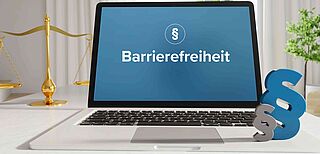With the entry into force of the new BITV 2.0, not only have the requirements become more extensive, but compliance with them is also being increasingly monitored by the federal and state governments. Non-compliance may result in fines or bans on the provision of certain services.
Public bodies should first check whether they are obliged to remove digital barriers and what they must do as a result to avoid possible sanctions due to non-compliance.
What is an accessible website according to BITV 2.0?
On the basis of the Disability Equality Act (BGG), the legislator wants to enable all people to participate in the online economy. For this, existing barriers must be removed, especially for people with disabilities.
Typical disabilities and limitations are
Visual impairments in many gradations and variants
Physical impairments
Deafness
Mental impairments and language barriers
For a website to be considered accessible, it must meet certain technical and content requirements. These are defined in the WCAG (Web Content Accessibility Guidelines). The top level of these criteria is formed by the four most important principles, which represent the basis of accessibility on the web:
How can I check if I am affected?
The websites of public bodies in the EU are affected - but this also applies to the websites of companies that are at least 50% publicly owned.
The new BITV 2.0 guideline refers obligatorily to:
- Colleges, universities and universities of applied sciences
- special-purpose associations - associations of municipalities and municipal associations
- Statutory health insurance funds and associations of panel doctors
- Social insurance funds
- Chambers of industry and commerce, chambers of lawyers and doctors, professional associations, chambers of crafts and guilds
What are the penalties for non-compliance?
The accessibility of websites and web applications is mandatory for public bodies, and compliance is increasingly monitored by federal and state supervisory authorities. To this end, random checks are carried out on the accessibility of websites.
Non-compliance can result in legal action or fines. However, investing in an accessible online presence not only fulfills legal requirements, it actually benefits all users and also contributes to SEO rankings and conversions.
Conversely, non-accessible websites may become less interesting for search engines and rank lower in search results.
With the help of the BITV self-assessment, you can assess the accessibility status of your website using a checklist with 98 test steps.
To officially check a website for its accessibility, a BITV test can be performed by a testing agency for a fee. It compares the current status of a website with the requirements of BITV 2.0.
Thefollowing test centers perform the BITV test and WCAG test according to the BIK test procedure.
How we can support your company around the topic BITV and accessible websites:
- We offer comprehensive advice on the requirements and guidelines of the BITV and perform an accessibility analysis of your existing website to identify potential weaknesses.
- We are happy to support you in redesigning or adapting your website to meet the requirements of BITV. This includes the design of a user-friendly and accessible user interface as well as the implementation of accessible techniques and functions. In addition, we can support you in creating accessible content.
- In training courses and workshops, we can raise awareness of accessibility and impart knowledge about the implementation of accessible websites according to BITV. This can help ensure that your organization complies with accessible standards in the long term.
- If desired, we can also help you obtain an official accessibility certificate for your website. This can officially validate your efforts to create an accessible online presence.
Oliver Parrizas will be happy to answer any questions you may have on the subject. +49-800-911-91-91





